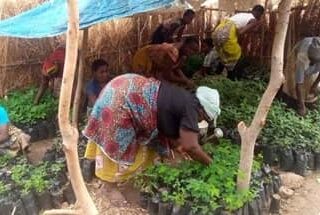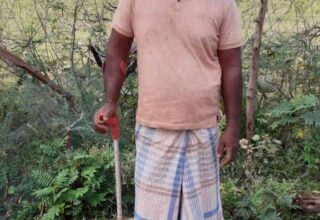In Dharavi, an informal settlement in Mumbai, India, two women leaders are drawing on their past experience to feed the most vulnerable and extend essential services to tackle the impacts of COVID-19. Shweta Sundar and Bharat Gangurde report.
This is the nineteenth in the series of stories from Voices from the Frontline initiative by ICCCAD and CDKN.
Vidya Balkrishna Mane and Harshada Ganesh Doiphode, two women leaders born and brought up in the informal settlement of Dharavi, in Mumbai, India, have been actively involved in social work for many years. Currently both of them are working in the administration of two local schools.
With a population of approximately 8, 50, 000, Dharavi is home to a wide range of people coming from different parts of the country in search of employment. Most of these migrants work as daily wage earners.
Ever since Mumbai recorded its first case of coronavirus, Dharavi has been recognised as a special zone due to its high population density of 354,167 per square kilometer, coupled with the inadequacy of its basic services, such as housing, water, sanitation, and health care. The majority of the inhabitants depend on community toilets, where maintaining physical distance is next to impossible.
Dharavi case of COVID-19
COVID-19 adds to the existing public health problems already faced by the residents of Dharavi. Poor understanding of the virus and basic precautionary measures together with disruptions in regular maintenance of community facilities, such as toilets, have further increased people’s risk of getting infected.
As the number of positive cases rose in Dharavi, access to ambulances, hospital beds, and quarantine centres became difficult. Dharavi had the stigma of being highly unsafe, which made the situation worse.
“People’s perception of Dharavi is that [the people] who reside here are poor, have a disreputable character and are involved in crimes. A lot of neglect in service provision took place due to this” Harshada shares.
After surviving the initial months of lockdown on savings, the daily wage earners started facing difficulties in providing for their families. Loss of jobs and food insecurity, together with fear of eviction and inability to return home resulted in frustration for most of the residents.
“The managers (locally known as Seths) of the migrant workers left for their villages, leaving the workers behind. Even if rations were being distributed, they did not have gas stoves or kerosene stoves. How could they cook for themselves?” Vidya laments.
Realising the severity of the situation, both Vidya and Harshada decided to stand beside the most vulnerable. Initially they started working merely with their own capacity, but soon many experienced community leaders of Dharavi collaborated with them.
Providing food support
For years, Harshada has been involved in providing cooked food to families coming to government hospitals in Mumbai, although she was never affiliated with any organisation. Her prior experience allowed her to take proactive initiatives to ensure food security during this unprecedented situation, when the relief provided by the government is largely insufficient.
To start with, she conducted a survey – with invaluable help from local youth – to understand the community’s needs. In response to growing demand for food, she started collecting ingredients from her network and began providing cooked meals as well as ration kits.
“I had contacts from school who provided us with cooking utensils, I sourced the food materials and a gas cylinder and we started preparing food at the school. We distributed the packets not only to the people of Dharavi, but also to those living on the roads” she shared.
During Ramzan (Ramadan) she and her team procured fresh fruits and made fruit custard for the families who could not afford Iftar (the breaking of the fast). She also liaised with a local factory, sourced and distributed vermicelli (locally known as “Sevaiya”, a traditional Eid desert) to Muslim families to celebrate Eid.
Harshada also visited the quarantine centre established at her school and found out the food served to patients lacked the required protein content. Instead of relying on the local authority to include more protein-rich food in the menu, she started boiling eggs and sent them to the quarantine centre.
While Harshada chose to feed people by herself, Vidya decided to collaborate with existing relief distribution campaigns and made sure their relief packages reached the poor. “I made a list of organisations who could help us by supplying rations that we could distribute in our neighbourhood. Even if I would get 20-25 packets, I would quickly distribute and make sure a different house gets a packet each time,” Vidya explains.
Mobilising a group of women from her self-help group called “Bachat Gat”, she collected information from door-to-door and sent the list via WhatsApp to the local Ward office, which was in charge of providing food relief.
Ensuring hygiene
While the residents managed to receive food support from different sources, they continued using common toilets without maintaining hygiene protocols. To solve this problem, Vidya utilised the connections that she made while working for Bhoomi Swachhata Foundation, a community-based organisation which she co-founded in 2018.
Organisations such as Triratna Prerna Mandal and UNICEF helped her to install hand sanitising devices as well as provided protective equipment and materials to clean toilets. Furthermore, awareness raising campaigns were also held to sensitise people on the basic hygiene measures.
Menstrual hygiene was also compromised during the pandemic. The lockdown caused unavailability of sanitary napkins as factories and medical stores were closed. “Pharmacies which had some stock, hiked the price from 20-25 rupees to 50-60 rupees. How can females afford sanitary pads without any payroll?” Harshada wonders!
“I know two sisters who were not able to afford 2 packs of sanitary napkins, so they bought only one for 60 rupees. Each pack has 4 napkins, they decided to cut them in half to make 8 pieces!” she adds.
But Harshada and Vidya were aware of the importance of menstrual hygiene and acted accordingly. Relying on the training that the members of “Bachat Gat” received on making sanitary napkins before the lockdown, Vidya started making and distributing sanitary napkins to local women and young girls. Harshada also collaborated with Vidya, bought 500 napkins from her and sold them at a cheaper rate in her neighbourhood.
Advocating with local government
Harshada, due to her deep rootedness in the community was able to perceive the different needs of different families. Due to the prolonged closure of private clinics and DOT centers, many residents were unable to get medical check-ups for non-COVID health issues.
In Dharavi, there are a number of patients with Tuberculosis who regularly require medicines which are only available at DOT centers. But the centers were closed due to lockdown and no doctors were available. Using her connections with the media, Harshada brought the local Municipal Corporation’s attention to this, which resulted in a legal obligation for doctors to attend the patients.
She also organised many health camps and COVID check-ups liaising with local hospitals, as well as distributed medicines to poor households. As she distributed medicines, she explained the viability of buying local brands, which are cheaper and easily available.
The biggest lesson that COVID-19 has taught both the women is the strength of humanity regardless of religious and economic barriers. To them, it was imperative to help the people by all means, despite facing personal hardships. “One of the important lessons that the pandemic has taught me is: it is okay to seek help from others. It has forced me to question the blessings of my life seeing the plight of others,” Harshada concludes.
Interviewer’s Perspective
The global pandemic has revealed the inability and incapacity of external aid to support communities. The fear of transmission, especially in low-income, high-density settlements kept large organisations and government at bay during the lockdown. In a case such as Dharavi, the citizens had no choice but to rise to the occasion in their limited capacities. Until now, institutional support to local organisations has been limited to financial or material help. However, there is scope for preparedness by building capacities of community-based organisations and community leaders to create self-sufficiency in times of future crises.
About the Interviewers
Shweta Sundar is an architect currently interning with Urbz. She has prior experience in post-disaster housing reconstruction, social housing and community-led development of the built environment in both urban and rural contexts.
Bharat Gangurde is an Urbz archivist and office administrator, with a background in commerce. He participates as a researcher and the on-site expert for various Urbz projects.
Urbz is an experimental action and research collective, specialising in participatory planning and design with teams in Mumbai, Bogotá, São Paulo, Geneva and Seoul.
About the Interviewees
Vidya Balkrishna Mane is a 41-year-old woman who is a full-time employee in a school administration in Dharavi. Vidya is a co-founder of two women’s self-help groups called “Bachat Gat” and “ Bhoomi Swachata Foundation”.
Harshada Ganesh Doiphode is a 32-year-old woman and also an employee at a local school. She has been actively involved in social work for many years, and contributed in relief activities during Kolhapur floods 2019.






